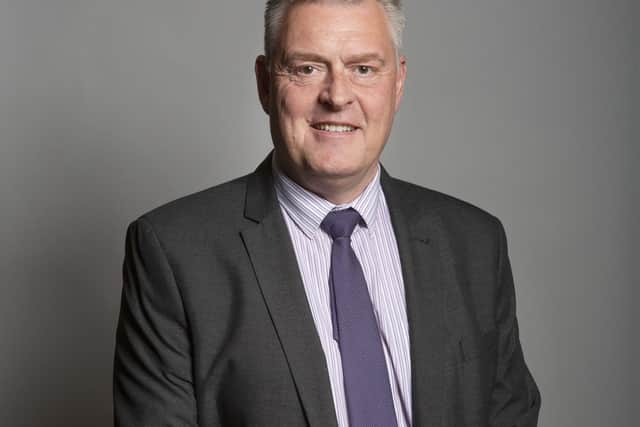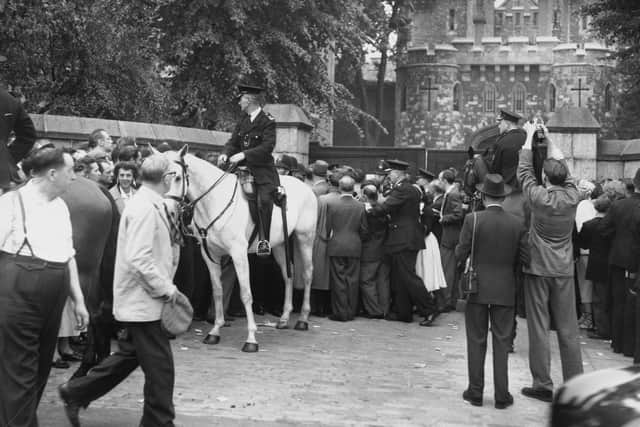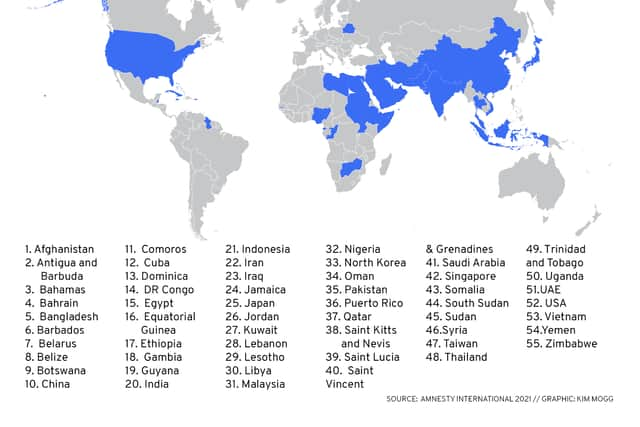Death penalty: when was it abolished in UK, what was punishment for, which countries still have death penalty?
and live on Freeview channel 276
Ashfield MP Lee Anderson has said he supports the return of the death penalty in an interview with The Spectator.
The newly appointed Deputy Party Chairman for the Conservative Party described capital punishment as having a “100% success rate”, explaining that “nobody has ever committed a crime after being executed”. Labour has given a swift reaction to the controversial appointment, with MP Zarah Zultan tweeting the Conservative Party was “scraping the barrel”.
Advertisement
Hide AdAdvertisement
Hide AdThe death penalty has been abolished in the UK for over half a century, but the practice is still widespread around the world, with thousands of people being sentenced to death every year. So, when was the death penalty abolished in the UK, what was it used for and what countries still use it? Here’s everything you need to know.
What did MP Lee Anderson say?
Prime Minister Rishi Sunak appointed the MP the role of Deputy Chair of the Conservative Party, despite comments he has made in the past which have been deemed to be controversial.


In an interview with The Spectator, Anderson said that he would support the return of the death penalty in the UK, telling the publication: “Nobody has ever committed a crime after being executed. You know that, don’t you? 100% success rate.”
The MP for Ashford went on to explain: “Now I’d be very careful on that one [the return of the death penalty] because you’ll get the certain groups saying ‘You can never prove it.’ Well, you can prove it if they have videoed it and are on camera - like the Lee Rigby killers. I mean: they should have gone, same week. I don’t want to pay for these people.”
Advertisement
Hide AdAdvertisement
Hide AdHis appointment has been condemned by Labour, with MP Sarah Sultana tweeting that it was the Conservative Party “scraping the barrel”.
Reported by PA Media, the PM Rishi Sunak responded to reporters questions during a visit in Cornwall. Sunak said: “That’s not my view, that’s not the Government’s view.” He continued: “But we are united in the Conservative Party in wanting to be absolutely relentless in bearing down on crime and making sure people are safe and feel safe.”
When was the death penalty abolished in the UK?
The death penalty for murder was abolished in the UK in 1969. According to the Museum of London, public doubt about the use of execution had been brewing since 1957 after the cases of Timothy Evans and Derek Bentley. This led to the introduction of the 1957 Homicide Act which restricted the types of murder that would result in a death penalty sentence. By 1965 the death penalty was suspended, with it being completely abolished in 1969. However it would not be totally abolished for all crimes until 1998.
What was the punishment used for?
The death penalty had been used for murder up until it was abolished in 1969. However, in the 18th Century the English legal system outlined 220 crimes that could result in a death sentence. By 1861 the legal system was reformed with only five crimes resulting in execution including: murder, treason, espionage, arson in royal dockyards and piracy. Beheading and quartering was outlawed as a method in 1870 and the age you could be sentenced to death was raised from 16-years-old to 18-years-old in 1933.
Advertisement
Hide AdAdvertisement
Hide Ad

Who was the last person to be executed in the UK?
The last two people to be executed in the UK were Peter Allen and Gwynne Evans. They received the sentence for the murder of John Alan West and were both hanged on 13 August 1964. The last woman to receive the death penalty was Ruth Ellis, who was convicted of the murder of her lover and hanged in Holloway Prison in 1955.
Which countries still have the death penalty?
The death penalty is still currently legal in 55 countries around the world.


According to Amnesty International the countries with the most executions in 2021 were: China, Iran, Egypt, Saudi Arabia and Syria, with the most common methods of executions being: beheading, hanging, lethal injection and shooting. There were an estimated 579 executions in 2021, but the real figure remains unknown as Chinese date is classified.
